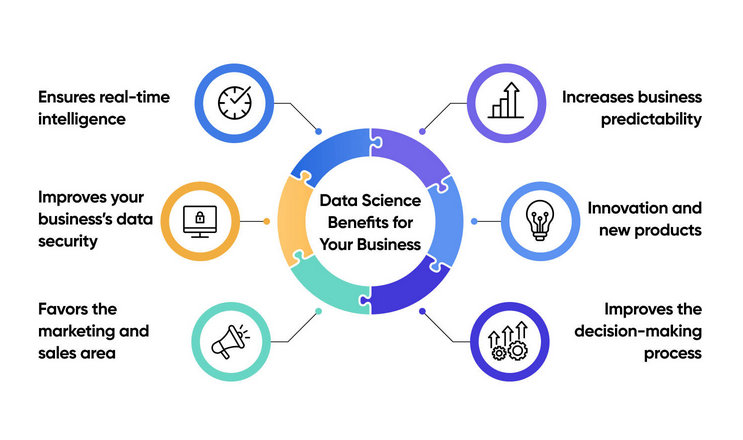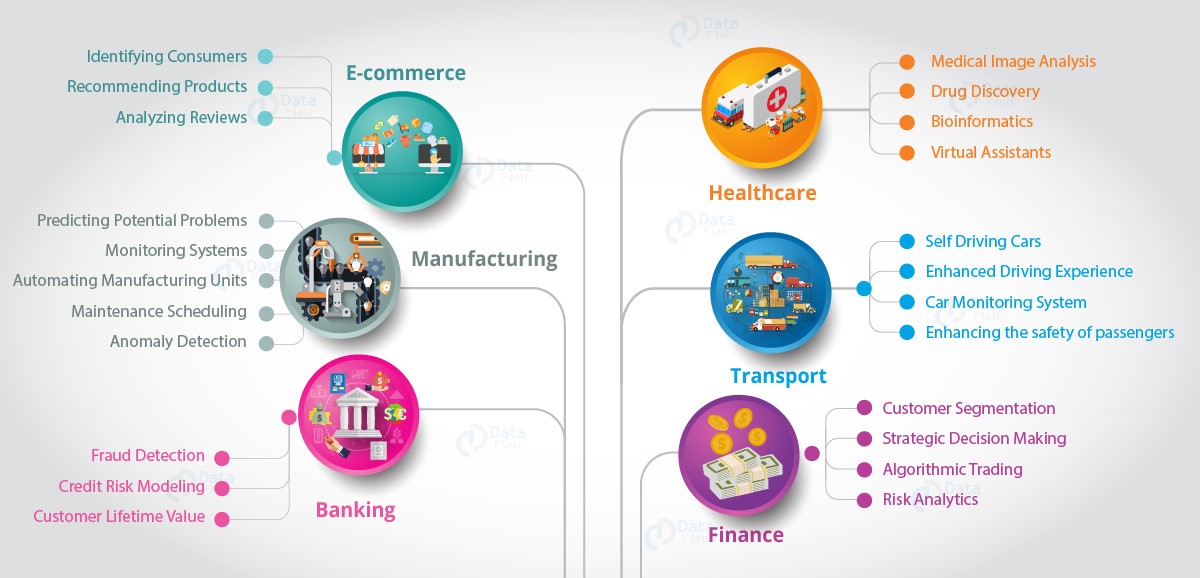Unlocking the Power of Data for Informed Decision-Making and Innovation
In the modern digital era, data is one of the most valuable resources for businesses and organizations across the globe. Data Science has emerged as a powerful field that empowers companies to unlock the hidden potential of their data and use it for informed decision-making, predictive analytics, and innovation. In this blog, we will explore what data science is, why it’s important, and how it is transforming industries by enabling smarter, data-driven decisions.
What is Data Science?
Data Science is an interdisciplinary field that combines statistical analysis, machine learning, data mining, and computer science to extract insights and knowledge from structured and unstructured data. It involves various processes, such as data collection, cleaning, exploration, modeling, and visualization, to uncover patterns and trends that drive decision-making in real-time.
By leveraging tools like Python, R, SQL, and powerful machine learning algorithms, data scientists can analyze vast amounts of data and derive actionable insights. These insights are used to predict future trends, optimize business processes, and enhance customer experiences.

The Key Components
It can be broken down into several core components that work together to transform raw data into valuable information:
- Data Collection and Acquisition
The first step in any data science project is gathering the right data. This data can come from various sources, including databases, APIs, web scraping, IoT devices, and social media platforms. - Data Cleaning and Preprocessing
Raw data often contains errors, missing values, or inconsistencies. Data scientists spend a significant amount of time cleaning and preprocessing this data to ensure it’s ready for analysis. This step involves removing duplicates, correcting errors, and handling missing values. - Exploratory Data Analysis (EDA)
Once the data is cleaned, data scientists perform EDA to understand its structure, relationships, and trends. This involves using statistical methods and visualization tools to uncover patterns and anomalies. - Modeling and Algorithms
With a deep understanding of the data, data scientists apply machine learning models and algorithms to make predictions or classify data. Common techniques include regression, clustering, classification, and time series analysis. - Data Visualization
Data visualization is crucial in data science. By creating visual representations such as charts, graphs, and dashboards, data scientists make complex findings accessible and understandable for decision-makers.

The Importance in Business
Transforming industries and businesses by providing actionable insights that drive innovation, improve efficiency, and enhance customer satisfaction. Here’s how data science benefits organizations:
- Predictive Analytics and Forecasting
By analyzing historical data, data scientists can predict future trends with remarkable accuracy. This helps businesses in areas like demand forecasting, inventory management, and financial planning. - Personalized Customer Experiences
Data science allows companies to better understand their customers’ behavior and preferences. By analyzing customer data, businesses can deliver personalized recommendations, targeted marketing campaigns, and customized products or services. - Improved Decision-Making
With data-driven insights, companies can make more informed decisions that are based on facts, not just intuition. This leads to more strategic and effective business planning, ultimately resulting in better performance and higher profitability. - Optimizing Operations
Data science enables companies to identify inefficiencies and areas for improvement in their operations. Whether it’s supply chain optimization, workforce management, or production processes, data-driven solutions help streamline operations and reduce costs.

Applications of Data Science Across Industries
Healthcare
In healthcare, it is used to analyze patient data, predict disease outbreaks, improve diagnosis accuracy, and personalize treatments. Machine learning models help detect patterns in medical records and predict potential health risks.
Finance
Data science plays a vital role in fraud detection, algorithmic trading, risk management, and credit scoring in the financial sector. By analyzing large volumes of transaction data, financial institutions can detect unusual activity and mitigate risks.
Retail
Retailers use data science to understand customer purchasing behavior, optimize pricing strategies, and manage inventory. Predictive analytics can help businesses forecast demand and make better decisions about stocking products.
Manufacturing
In manufacturing, data science optimizes production lines, predicts equipment failure, and improves product quality. Data-driven insights help businesses anticipate maintenance needs and enhance operational efficiency.

Challenges in Data Science
While the benefits of data science are undeniable, there are challenges involved in implementing data-driven solutions. These include:
- Data Privacy and Security: Ensuring data is handled ethically and securely is crucial, especially when dealing with sensitive information.
- Data Quality: Incomplete or inaccurate data can lead to faulty insights and predictions, making data quality a key challenge.
- Skill Gap: The field of data science requires a blend of expertise in statistics, programming, and domain knowledge. The shortage of skilled professionals is a challenge that many organizations face.
The Future of Data Science
As technology continues to evolve, so will the field of Data Science. With the rise of artificial intelligence, deep learning, and big data technologies, the ability to analyze massive datasets and make complex decisions will only grow more sophisticated. The future of data science holds endless possibilities for innovation, efficiency, and business transformation.
Conclusion
Data science is the key to unlocking the full potential of data. By turning raw data into actionable insights, organizations can drive growth, improve operational efficiency, and make smarter decisions. As the demand for data-driven solutions continues to grow, data science will remain a cornerstone of digital transformation across industries.

For more information, please visit


